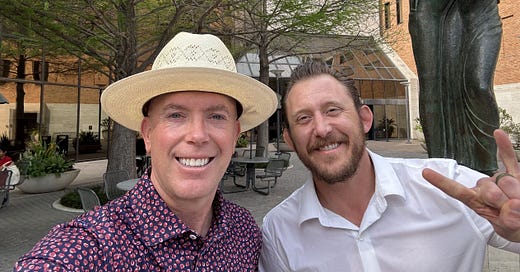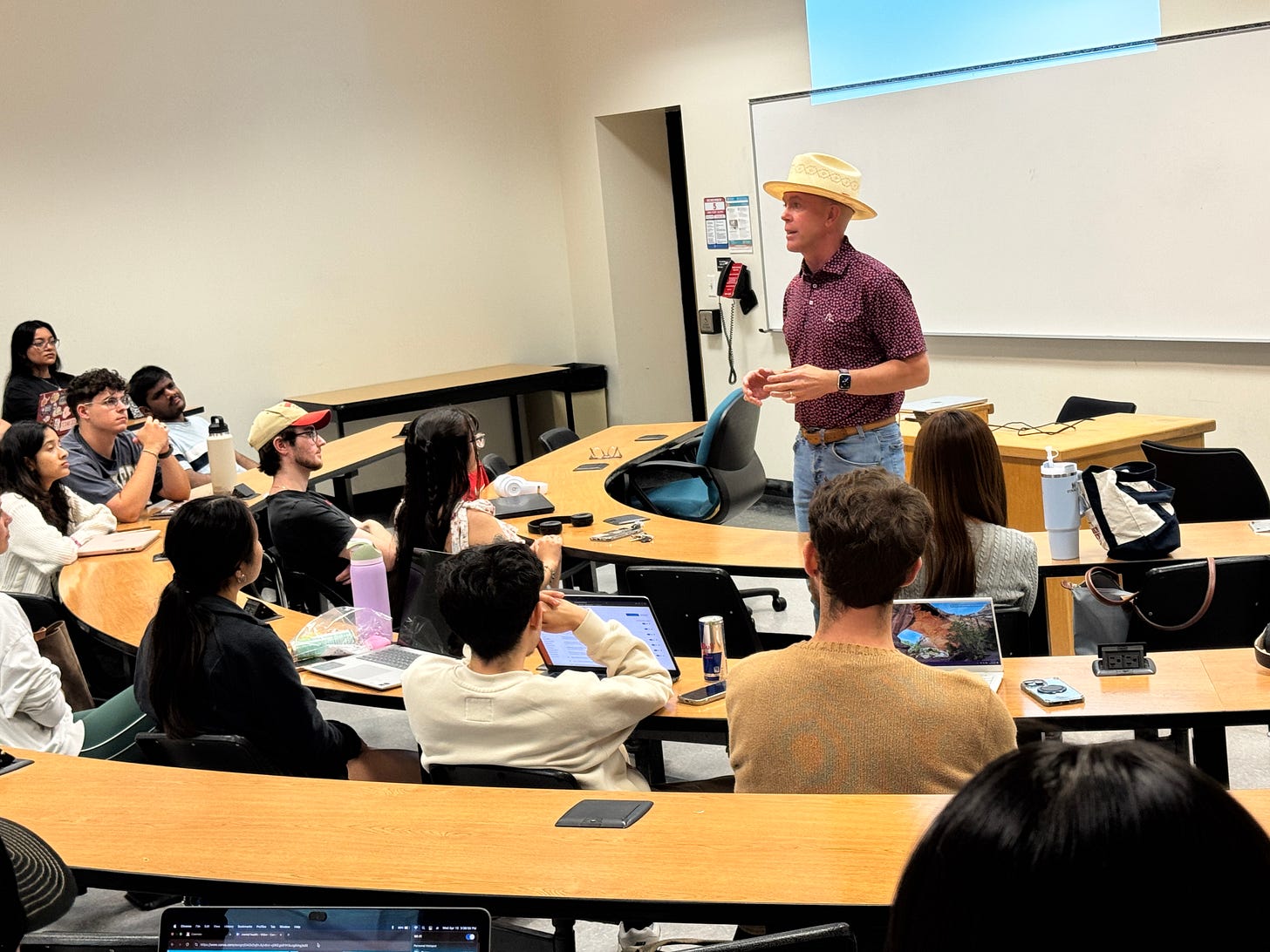Founder Story: Joseph Kopser
After 20 years in the Army, Joseph Kopser bet on himself. He launched a company that sold to Mercedes-Benz, helped redesign leadership education at UT, and became one of the most influential voices in Austin’s entrepreneurship and veteran community. This week, he dropped into my class and gave my students a masterclass on what it really means to be an entrepreneur.
You can’t talk about entrepreneurship, UT, or veterans in Austin without someone asking:
“Have you talked to Joseph Kopser?”
I’ve admired Joseph’s path for a long time—and for good reason. We’ve got more than a little overlap: both West Point grads with engineering degrees, both served in the First Cavalry Division, both deployed to Iraq, and both ended up as professors at the University of Texas.
The difference? Remember when I talked about failing my SOSH paper in my article procrastination, Joseph was teaching in the Social Sciences Department. He wasn’t my professor—we just missed each other—but maybe he would’ve given me a better grade.
All that to say, he’s someone I’ve looked up to—not just for what he’s built, but how he shows up. If there’s a veteran founder meetup or startup showcase in Austin, odds are Joseph’s on stage as the MC or keynote in his signature Stetson.
This week, he was in my classroom.
And for 75 minutes, my students got an absolute clinic on what makes an entrepreneur. Here’s what we learned:
Lesson 1: Entrepreneurs Are Just People Who Can’t Leave Problems Alone
Joseph didn’t plan to be an entrepreneur—he wanted to be a pilot. But a failed vision test rerouted that plan, and like any good leader, he adapted.
In the Army, Joseph spent two decades solving problems—pushing back against broken systems and asking, “Why can’t we do it better?” That instinct led him to build RideScout, a multi-modal transportation app before Uber and Lyft were household names. Why? Because traffic in Austin sucked—and he couldn’t stop thinking about how to fix it.
Turns out, that’s where most businesses start.
Lesson 2: The Idea Is Just the Start
RideScout didn’t begin with a polished pitch deck. It started as messy research, late-night conversations, and friends who believed enough to invest. The early prototype was rough. The product-market fit wasn’t obvious. But Joseph stuck with it, and that messy start eventually became a successful acquisition by Mercedes-Benz.
in fact during a pitch competition, one of the judges said it would be ridiculous to think that people would get into a stranger car to take them somewhere. Even with the rhetorical question, “have you ever been in a taxi? And did you know them before to took the ride.” They still didn’t see the vision. Turns out he was right.
He stayed on for two more years—not because he had to (he did), but because he believed in what he built.
What my students needed to hear:
No one hands you product-market fit. You build it—while underfunded, uncertain, and overwhelmed.
Lesson 3: The Army Trains Great Entrepreneurs
Joseph didn’t become an entrepreneur after the Army. He realized he already was one.
The military teaches you:
How to make high-stakes decisions under pressure
How to operate in chaos
How to lead teams with limited resources and shifting goals
It also teaches you how to build—and building is the heart of every great venture.
Lesson 4: The Exit Isn’t the End
Joseph didn’t disappear to Cabo after the Mercedes deal.
He kept building—investing in startups, mentoring founders, and launching new ventures through Grayline Group. The terrain changed, but the mission stayed the same.
Real entrepreneurs don’t retire. They just find new problems to solve.
Lesson 5: Know If You’re a Builder or an Operator
Joseph made an important distinction: most founders are either builders or operators. Rarely both.
He’s a builder. His weapon? Communication. He knows how to tell the story, get people excited, and move capital and talent toward an idea.
His advice: figure out which one you are. And know when it’s time to step aside—or step in—based on what the business needs next.
Lesson 6: Great Teams and Great Ideas Win
Investors look for two things:
A strong founding team
A compelling idea with real market pull
If you have both, investors will be lined up to get a piece. If you’re missing one, be ready to grind.
Lesson 7: Not Every Battle Is Won
Not every startup works. Not every launch lands. The key is adaptability. Can you pivot? Can you take the hit and keep building? Can you handle the stress not only you put on yourself but also your employees and family not knowing if there will be income in the coming months.
Joseph reminded my students: unless you’re ready to dedicate years of your life to a single problem—through failure, stress, and financial uncertainty—you might want to join a startup before trying to launch your own business.
Final Thought
Joseph didn’t just bring a résumé—he brought the receipts.
He showed my students what happens when you combine service, strategy, and startup grit. But the biggest lesson?
Entrepreneurship doesn’t start with a pitch deck.
It starts when someone looks at a broken system and says,
“Why not do it differently?”
Connect with Zach
Website • Twitter • LinkedIn • Youtube






